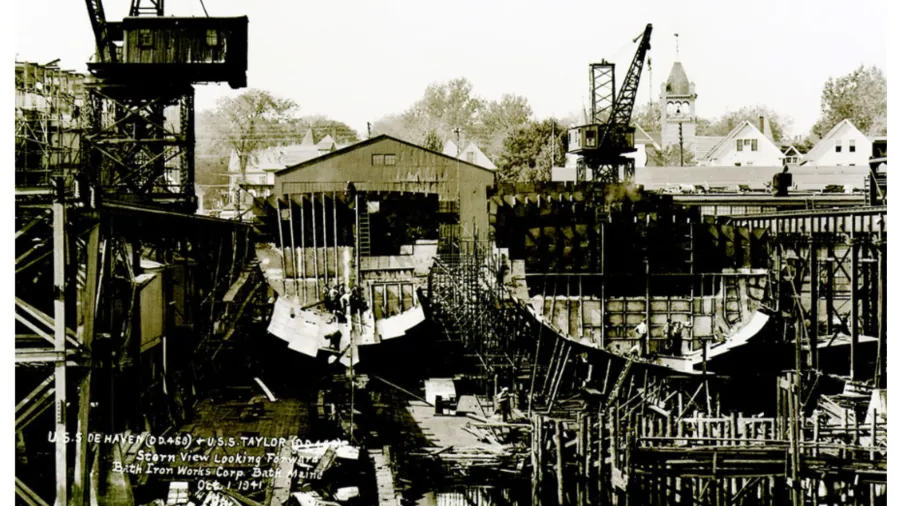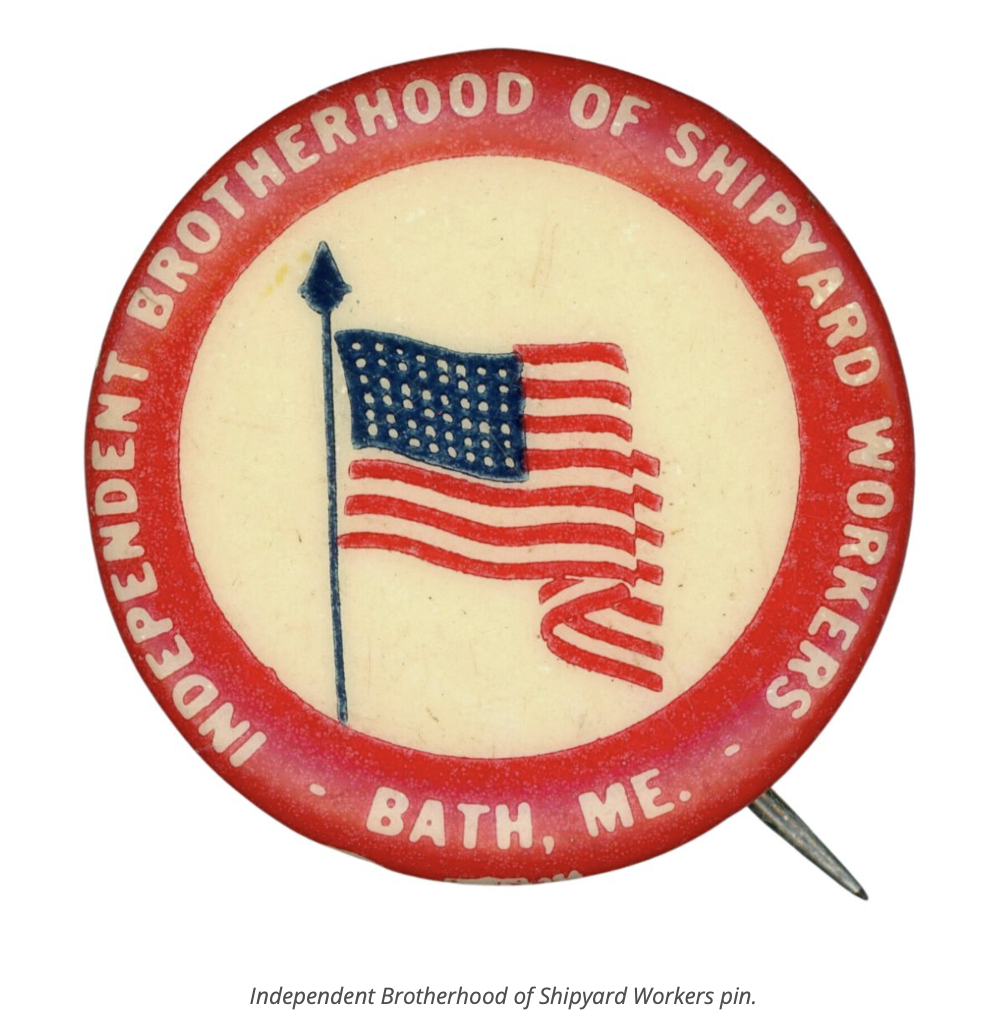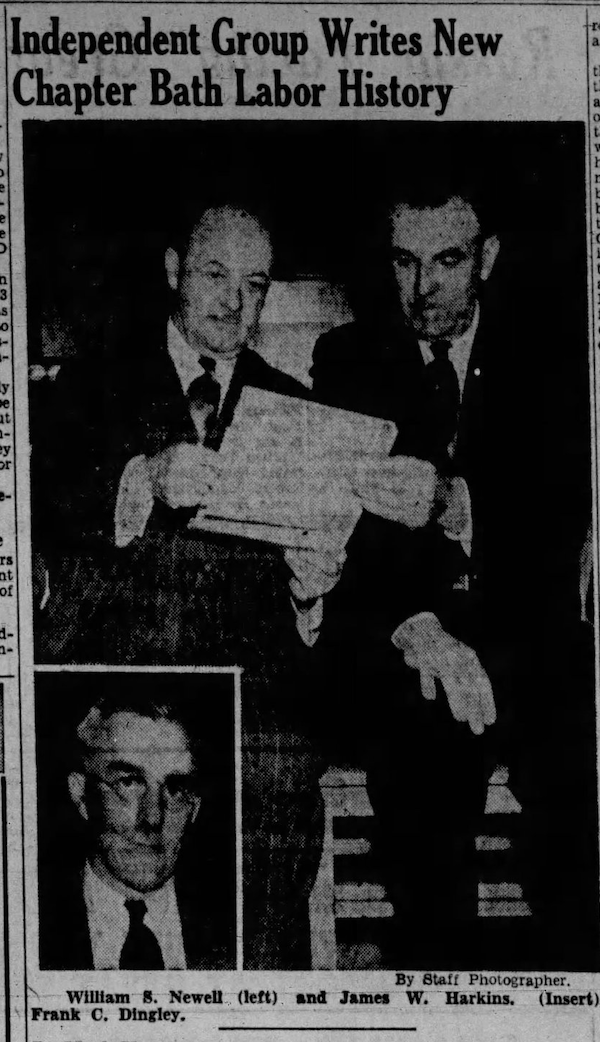Local S6 & the Spirit of the CIO: "The Hicks Beat the City Slickers!”

PHOTO: Bath Iron Works, Oct. 1, 1941.
In the early spring of 1940, a year and a half before the US entered World War II, there was a record 2,242 shipbuilders working on five destroyers at Bath Iron Works— far exceeding the number employed at the yard during World War I. Shipbuilder Hermon Coombs recalled in an 1972 interview that the company was desperate to hire workers to fulfill its lucrative wartime contracts.
“BIW went all over the state holding sessions to get people to come into the plant to work, practically begging them to,” said Coombs. “'Course we was putting a ship overboard, delivering ship every…seventeen days. And that was quite a feat, you know.”
By 1941, the workforce had nearly tripled with 6,000 workers at Bath Iron Works building destroyers and merchant ships. Although the pro-CIO shipbuilders led by the militant welders had narrowly lost their first union election in December 1938, by the spring of 1940, Industrial Union of Marine and Shipbuilding Workers of America (IUMSWA) Local 4, CIO organizers had signed up enough worker to hold another election.
In the previous election, Local 4 filed charges against the company for supporting the International Brotherhood of Boilermakers, a more conservative and company-friendly AFL union. As a result, the company was forced to post a notice declaring that it would follow the law and not discriminate against IUMSWA members. In 1939, the AFL-affiliated International Association of Machinists set up a headquarters in Bath, but did not garner enough support to enter the union election of 1940. Local 4 was the only union on the ballot.
However, immediately before the election, the company announced wage increases and vacation pay. Just like in 1938, this classic anti-union trick worked and IUMSWA lost by just eight votes, 1,153 to 1,145. The failure of the CIO organizing drive was not necessarily an indication that a majority of workers opposed forming a union, but many thought the CIO was too radical.
Arthur Lebell, President of Local 4, said more and more workers became interested in unionizing after being passed over for bonuses due to favoritism.
“See before they had the union, a fellow'd go in there and he’d work a week or two, or two or three weeks something like and some foreman or lead man would take a liking to him. He'd take and lay a man off that had a year or two of experience, see,” explained veteran shipbuilder Walter McMann in 1973. “He’d keep this other man, because he was a good friend. Union stopped that, they went to straight seniority."
Shipbuilder Hermon Coombs agreed. “You're thrown on the mercy of the company, and that's all,” he said. “If the company thinks you should have a little more they'll give it to you…Well, the main thing, a union eliminates favoritism.”
Shipbuilders also complained about a company policy that mandated they be fired if they were absent for two days a month. Another grievance was that they were sent home without compensation during inclement weather, even if they had traveled great distances.
A year later, in 1941, the CIO once again signed up enough workers to hold an election. However, this time around they had to contend with Independent Brotherhood of Shipyard Workers, a new independent industrial union that was organized to defeat the more militant union. When national CIO officials came to Bath to support Local 4, they learned that management tried to persuade a CIO member to form an independent union that would be funded by BIW President William S. Newell, according to labor historian Charlie Scontras.
According to the Portland Press Herald, the Independent Brotherhood was born in late 1940 when shipbuilder Jim Harkins expressed concern over reports that 23 plants engaged in defense work were tied up by strikes. Harkins, a 36 year resident of Waldoboro and father of six children, had worked many years in quarries all over the country. The paper described him as "a quiet, studious type," who had "observed all sorts of unions" and wanted a less militant alternative to the CIO. He had three sons who were eligible for military services and he feared the "sort of hell it would be for his boys at the front" if wartime production became tied up by strikes.
"Somebody mentioned an independent union that seemed to be doing all right at the Electric Boat plant at Groton, Connecticut, which was turning out submarines in great style, and the small group sitting on steps and timbers with their lunch boxes decided to find out what made the Groton union successful," wrote the Press Herald. "They found out and went to work to establish a similar union at the Bath Iron Works. ..The small group figured the Brotherhood had a chance."
The Independent appealed to nationalist sentiment as anti-CIO elements branded IUMSWA organizers as “outside agitators” and “communists.” The Independent Brotherhood contrasted itself as the more patriotic alternative and prominently displayed the American flag on its buttons. IUMSWA countered by charging the Independent Brotherhood with “Desecration of the National Flag. It accused the union of “using the flag to exploit such promiscuous display of pseudo-Americanism."

The CIO-leaning Shipyard Worker reported that the Independent Brotherhood, by its own admission, was a funded by the company. Unlike the more aggressive IUMSWA, the Independent union used much more moderate proposals to attract members, such as full pay for workers who were out sick on accident compensation and a ten percent discount at local Bath businesses.
The new election was to be held on June 25, 1941, and this time President Newell promised he would negotiate with IUMSWA if it polled a majority. However, Local 4 leaders accused the company of deploying its salaried employees to wage “a campaign of vicious slander and intimidation” against IUMSWA members that was "unrivaled in its history.” Local 4 filed charges of "company unionism" against the Independent union and won in an NLRB decision. The ballots were impounded on the eve of the election. When the new election was held on August 12, 1941, the Independent Brotherhood handily defeated IUMSWA Local 4 with 2197 voting Independent, 1094 for IUMSWA and 291 voting no.
Local 4 immediately filed unfair labor changes with the NLRB alleging that the Independent Brotherhood “was assisted by the company” and was therefore a company union. This time the charge was dismissed. When the Independent union signed an agreement with the company for a "union shop," the CIO called for a new election, but again it was soundly defeated, by a margin of 3,182 to 2,310.
The Portland Press Herald reported that “unbiased observers” saw the election as rival unions offering the same things to shipbuilders. But Independent Brotherhood supporters reportedly saw it as a struggle between the "City Slickers" and "The Hicks.” The day after the election a big banner was hung in the Brotherhood’s union hall with the words: "The Hicks Won."
Scontras noted that workers were skeptical of the CIO because of a recent surge in coal strikes and the violent 1937 Lewiston-Auburn shoe strike that ended in defeat for the CIO. The Maine State Federation of Labor (MSFL), the state AFL federation, blamed the "radical" CIO on the Independent union's victory. The CIO’s organizing methods, it argued, succeeded in “gumming up the works,” so that workers became disgusted with both AFL and CIO unions and opted to go independent.

The contract between BIW and the Independent Brotherhood barred strikes, lockouts, work stoppages and slowdowns. The agreement established the Independent as the sole bargaining agent for the employees until 1943. The agreement provided for an open shop security arrangement and made no reference to wages, but did provide for a grievance system, seniority rights, five paid holidays annually, one week's vacation with pay for everyone who had been employed in the yard from eighteen months to ten years, and two weeks for all employed for more than ten years, and a reclassification of employees.”
The new union represented 6,000 workers in the midst of World War II. The pro-CIO workers continued to turn in cards for more elections during the war, but the company dampened support when it extended the benefits won by the CIO in the South Portland yards to Independent Brotherhood members in Bath.
That November the CIO experienced another bitter loss as Independent Brotherhood of Shipyard Workers supporters in Quincy, Massachusetts voted in a landslide, 8,991 to 2564, to defeat the CIO and affiliate with the Independent. An Independent Brotherhood official expressed glee at the CIO’s defeat, telling the Times Record that CIO founder John L. Lewis, the President of the United Mine Workers of America, was “breaking” the CIO’s "own neck" by striking coal mines for a closed shop, where workers would be required to pay dues to the union for collective bargaining.
“[CIO President] John L. Lewis must be shown that he is not a dictator in these United States,” said the official. “It is no use appealing to his patriotism for I don’t think he has any. The closed shop problem seems only an excuse to slow up defense production. If it was a matter of wages there would be some excuse, but none for his dictatorial manner. The sooner the better for this country. His attitude is costing him the support of thousands of workers in his own organization and in the end will result in his tumble from the wall of egotistical ambition with a crash which will leave its bruises on the C.I.O organization for years to come, if it does not entirely kill it.”
But as it turned out, the Independent Brotherhood was a bit hasty in writing the IUMSWA’s epitaph and CIO sentiment remained strong at the yard.
As shipbuilder Hermon Coombs recalled, “It seemed that almost every year we had, welI, should I say an invasion by the CIO trying to unseat the independent.”
Stay tuned next week for the conclusion of "Local S6 & The Spirit of the CIO!"
